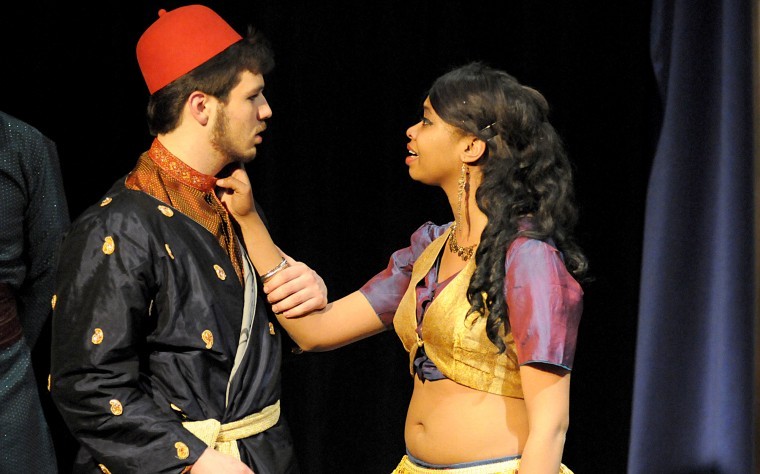NIU’s Arabian Nights an exploration of storytelling
Jerry Burnes | Northern Star Mitchell Martin, playing the Mad Man, and Jewelin Hale, playing the Perfect Love, act out a scene of Arabian Nights Wednesday night.
March 30, 2011
Before Aladdin was swooning chicks on his flying carpets and playing the flunky to Robin Williams rapid-fire humor, he was just a figment of Scheherezade’s imagination.
Her imagination will unfold in the School of Theatre and Dance‘s production of The Arabian Nights, opening tonight at 7:30 p.m. in the Stevens Building Players Theatre. The show, directed by Dr. Patricia Ridge, runs Thursday through Sunday and Wednesday, April 6 through Sunday, April 10.
Adapted from the 1970s English translation of Middle Eastern folk tales titled One Thousand and One Nights, The Arabian Nights follows the stories of Scheherezade, (played by Graduate Teaching Assistant Kendra Helton) as she tells them to her murderous husband, the Persian King Shahyar (played by Graduate Teaching Assistant Nick Ferrucci), in an attempt to delay her own execution.
Because Scheherezade’s scheme is so effective, and a romantic bond begins to form between the two characters, the play accurately represents the ability of a story arc to captivate. By using a minimal set and a having cast members play multiple roles, Ridge places a lot of emphasis on the imaginative storytelling aspect of the play.
“We read a lot of scripts and this was one of the ones and I thought, since I’m a storyteller, I’d like to direct it,” said Ridge. “Because it’s full of stories and stories, in my opinion, are what connect people heart to heart. You know, they tell us about ourselves, they reflect a particular culture.”
But there is a particularly troubling aspect of the play. Taking place in ancient Iraq, a time and place when women had few formal rights, Arabian Nights loses a lot of gender equality in exchange for necessary historical accuracy. However, the lightness with which the show displays violence towards women and the frequency that female characters are displayed on the short end of the Madonna/whore complex can be pretty disturbing.
Why should we care about a love story between a woman and a man who murders women?
“That’s a question I thought about a lot too,” said Stage Manager Elizabeth Sprecher, senior theatre studies major. “It’s probably up to every audience member, but I think the biggest thing is the power of stories to transform him into less of a monster.”
Displaying the richness of the Iraqi culture, the play ends with a political statement about the war in which we are currently involved, according to Ridge.
“We came in with our shock and awe and wiped out a good part of that culture with the looting and everything like that,” Ridge said. “That was a statement from [Playwright] Mary Zimmerman and myself about how the United States went in there for no reason and look at what they did.”







